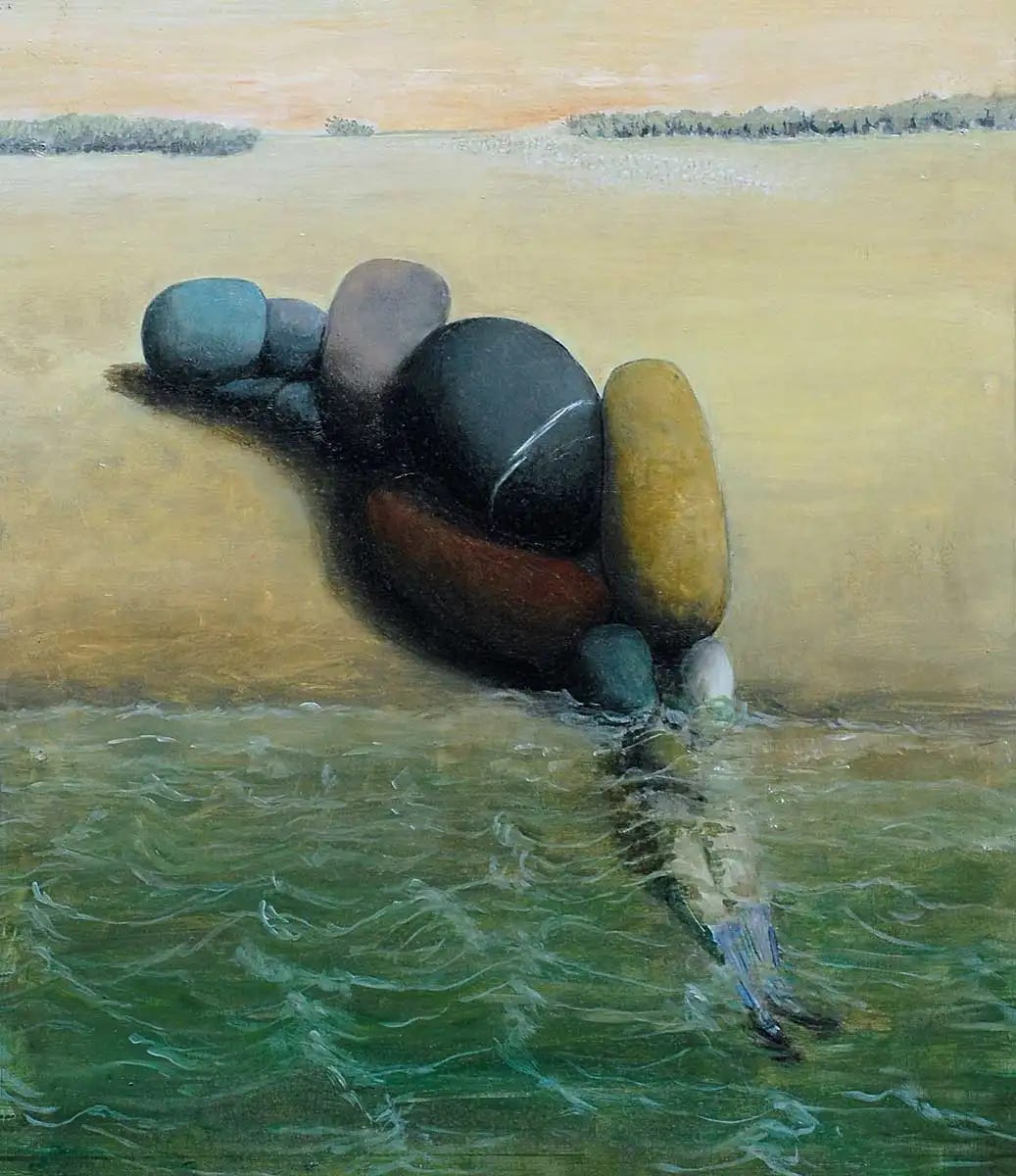Stone Woman
by Meret Oppenheim
The notoriety of being the creator of the fur-covered cup and saucer that had caused such a stir in 1936 rebounded badly on Swiss-born Meret Oppenheim. She returned to Basel, experiencing depression, and painted this extraordinary image of a figure made of rocks with human legs and feet. I have cast this progression into melancholia as a journey across a beach towards the sea. Calcification, or hardening, seemed to me to perfectly describe the experience of mental illness. I hope it is not upsetting to read. Be assured that this journey ends not in despair, but with the possibility of hope and recovery.
It happened gradually. You were walking in the forest and your head felt heavy. Another headache, one of those slicing pains in the sinus and temple. It was as if all the air and moisture, all the movement of blood and fluid and smooth-working muscle had stopped. Bones had fused together. Had dried. Had petrified. It was because of the trouble. It was because of the future.
You tried to hold up your head, to rearrange your shoulders and neck, swivelling the strong, connected parts to find support for the back of your head, where the pain was gathering. But your neck was tight and, horror! there was an immovable hump where your back met your neck. However you wriggled as you walked, moving one shoulder and then the other, still that solid ugly hump remained. Ouch! You cricked your neck; there was a snap and now you dare not move it again.
Still you walked, wishing to look up at the sky but afraid to pull the muscles on the other side of your neck. That was when your chin got stuck in a downward position and began to fuse with your chest. As the path to the beach opened out you looked down at the sand and at your sturdy shoes walking through it. The sand became deeper but you were unable to look up ahead to see how far it was to the water's edge.
As you left behind the last sheltering tree, a branch whipped back and struck your elbow. You cursed it and your arm began to throb which was maddening but gradually the throbbing stopped and, much worse, it grew numb. In your distress you did not notice the fence post and, walking bang into it, the other arm lost all feeling too.
The water wasn’t far now. These unfortunate incidents were made worse by the thoughts they called up, thoughts of the pressure of time, the malign attacks of chance, the unfairness of life. No, the water would be warm and comforting. There you could rest and be renewed. If you deserved such a thing. Did you deserve this? Did you deserve ease, rest and security? Who were you to exact such things as your right? What have you done to earn this? Why should you be the recipient of riches when the others starve? You are unworthy.
Ugh! Now you have twisted your knee! Not too badly, but it means you have to walk without bending it, like a marionette, or as if you used crutches. This throws your balance off and you pull your hip out of line.
The sun is streaming straight into your eyes as you reach the shoreline. It blinds you, and a strange fancy leads you to reach down to feel the skin of your waist and upper legs. What has happened? It is cold. Hard. Your body feels like a stone! This is the end. This is the death of hope. You are without humour, without companionship, without the chance of salvation or rescue. Apart from your legs under the knee socks you wore as a child and your feet in those black, buckled shoes, the whole of your body has become unbearably heavy and unwieldy. You fall, tumbling with a hollow rumble like the collapse of a pile of rocks onto the firm wet sand.
Now there is only instinct left. You inch along, curving and straightening what is left of your upper body like a caterpillar to move across the last bit of sand. With a sigh you feel the water around your feet at last. A bright recollection of paddling in the sea comes back. It was a hot day, you remember, a day many years ago. Your mother was there and she was smiling. She held your hand and you jumped the waves together.
You lie, abandoned on the sand, sinking blissfully into the memory of the water on that long-ago day. You can do nothing now but wait, as the water runs on, and hope you can rejoin that flow. To remain in this carapace, to be forever without hope or happiness, is to die. But to return to that moment of joy and love might mean that you can regain the soft, living body that you have lost.
You move your legs and feet in the water and dream as the sea soaks through your socks. The water feels like forgiveness or the embrace of plentiful, expansive life. It feels like the return of possibility.




1. I LOVE Meret Oppenheim's "Fur Teacup."
2. I've never seen this painting and I also love it. Thank you for that.
3. What a fantastic way to interact with a painting.
After her show in New York I discovered that Meret Oppenheim also wrote poetry. Here’s one of her poems:
For you, against you
Throw all the stones behind you
And let fall the walls.
At you, on you
The hooves tear loose
For a hundred singers above.
I gut my mushrooms
I am the first guest come through
And let fall the walls.